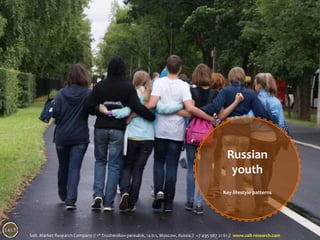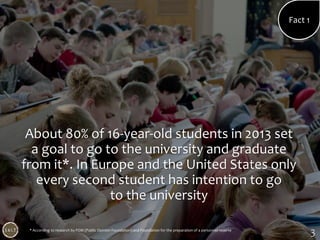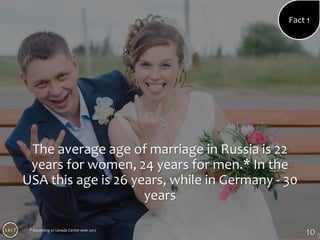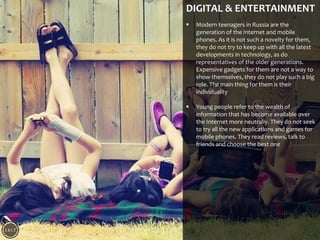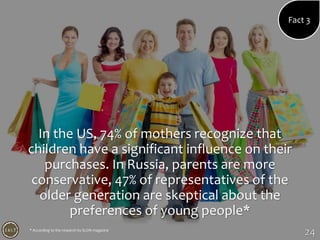Портрет российской молодёжи
- 1. Salt. Market Research Company // 1st Truzhenikov pereulok, 14 b.1, Moscow, Russia // +7 495 987 21 61 // www.salt-research.com Key lifestyle patterns Russian youth
- 3. 3 About 80% of 16-year-old students in 2013 set a goal to go to the university and graduate from it*. In Europe and the United States only every second student has intention to go to the university Fact 1 * According to research by FOM (Public Opinion Foundation) and Foundation for the preparation of a personnel reserve
- 4. 4 Young people in Russia are set to earnings, but more than 70% of them associate it with a career in big companies. In the US, 76% of teenagers plan to conduct their own business* Fact 2 * According to Levada Center
- 5. 5 Working age of Russian teenagers comes later, they usually start working after graduation. Part- time jobs are not usually welcomed by parents, they are possible only in case of real necessity* Fact 3 * According to the research by SLON magazine
- 6. 6 For young people in Russia vacations and travels are related to the career and work. The more successful the career is, the more opportunities they have.* In the US and Europe travels for teenagers are a measure of personal freedom Fact 4 * According to the research by the RAS Institute of Sociology
- 7. 7 While a quarter of teenagers in the United States are involved in volunteer activities, in Russia this culture is only beginning to emerge* Fact 5 * According to a study by Levada Center
- 8. 8 EDUCATION & CAREER Any education and the opportunity to develop play an important role in the lives of young people. On average, each student attends 2 to 3 additional courses in addition school Herewith, one of these activities is dedicated to physical fitness – modern teenagers pay more attention to sports than their predecessors Russian teenagers dream to link their future career with their current interests, but are too afraid to think ahead. Now it’s hard for them to imagine what they will do in 10 years. They would like to believe that they will just be successful, without specifying what this success will include
- 10. 10 The average age of marriage in Russia is 22 years for women, 24 years for men.* In the USA this age is 26 years, while in Germany - 30 years Fact 1 * According to Levada Center over 2012
- 11. 11 The average age of women giving birth is 23 years, in the mid-1990s, it was 20 years* Fact 2 * According to Federal State Statistics Service
- 12. 12 At the same time, 42% of people under 24 believe that they must first engage in a career, and only then think about the children and the family* Fact 3 * According to the survey by recruitment portal SuperJob
- 13. 13 FAMILY & MARRIAGE For today’s young people the family takes a back seat. Compared to previous generations, they do not associate their main desire – self- realization – with the marriage and the birth of children, although they do not deny the importance of these things For Russian teenagers, the family is rather the bastion of stability, something that will always exist, and where you can go back at any time Unlike the previous generation, modern teenagers often are the only children in the family or the younger children. Because of this, the image of a small child in their minds is mythologized. Teenagers do not have a specific opinion on this matter, so it is difficult to understand how important for them it will be to have their own children. They have no idea what it is and how it can affect the life
- 15. 15 89% of Russian teenagers use the Internet on a daily basis* Fact 1 * According to research by the Foundation for Internet Development
- 16. 16 At the same time, more than 80% of Russian teenagers regularly watch TV* Fact 2 * According to MASMI Russia
- 17. 17 Among people of 18 to 22 years, demand for mobile navigation is growing rapidly. In the US, the situation is similar - many teenagers poorly orient even in their cities* Fact 3 * According to the research by SLON magazine
- 18. 18 Less than 30% of Russian teenagers actively play computer games (51% in the US)* Fact 4 * According to the research by SLON magazine
- 19. 19 More than 40% of Russian teenagers have more trust in the media and not in the views of the social networks which are perceived as a means of entertainment.* In the US, the situation is quite the opposite Fact 5 * According to the Nielsen Company
- 20. 20 DIGITAL & ENTERTAINMENT Modern teenagers in Russia are the generation of the Internet and mobile phones. As it is not such a novelty for them, they do not try to keep up with all the latest developments in technology, as do representatives of the older generations. Expensive gadgets for them are not a way to show themselves, they do not play such a big role. The main thing for them is their individuality Young people refer to the wealth of information that has become available over the Internet more neutrally. They do not seek to try all the new applications and games for mobile phones. They read reviews, talk to friends and choose the best one
- 22. 22 In 2013, the Russian teens spent 5 to 6 billion dollars, which is 1.5 times more than last year. In the US teenagers spend 44 billion dollars* Fact 1 * According to the research by SLON magazine
- 23. 23 Teens in Russia buy online less than young people in the US and in Europe, but the way they make purchases is different from the traditional – first they search for information on the Internet and obtain the approval of peers* Fact 2 * According to a study of the Fitch consulting agency
- 24. 24 In the US, 74% of mothers recognize that children have a significant influence on their purchases. In Russia, parents are more conservative, 47% of representatives of the older generation are skeptical about the preferences of young people* Fact 3 * According to the research by SLON magazine
- 25. 25 CONSUMER BEHAVIOR Since modern Russian teenagers have more opportunities of leisure and shopping, their expenses have become more independent and mature, though they are not devoid of teenage specifics Internet plays an important role in making purchases: the needs of youth are formed by photos and pictures accidentally found in social networks. In addition, teenagers get acquainted with all the possible range on the Internet first, and only then try to find this in the offline stores
- 26. 26 Moscow 1st Truzhenikov lane, 14 b. 1 www.salt-research.com +7 495 987 21 61 Maxim Drozd, Director md@salt-research.com Mobile: +7 903 168 24 80 Marina Ovchinnikova, Innovations and Development Director mo@salt-research.com Mobile: +7 926 528 96 12 Salt © Essential ingredient in your marketing kitchen! www.salt-research.com Contacts
